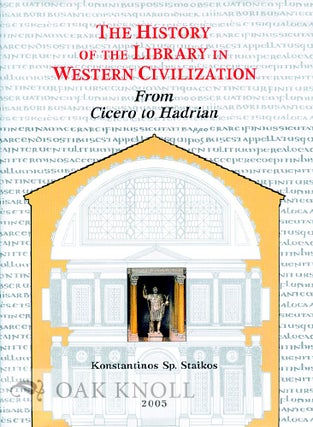
Whether it is to be found in a humble fragment of an anonymous written work or in a sumptuous parchment codex, it is an irreplaceable part of an ageless book such as the Book of Mankind said to have been compiled by Hermes Trismegistus, which, according to the priests of Thoth, was composed of 36, separate books.
Every book ever written is shown to be connected with every other, so that all together form a colossal pyramid of knowledge founded on the work of some ordinary, anonymous person who piously sifted through the records left by his ancestors in order to study their achievements.
The first person in the history of books and libraries who encouraged his fellow-men to respect the words and deeds of their forefathers was Aristotle. If he takes the credit for according due recognition to the authors of creative work, it is because he was moved more by what he considered a moral imperative than by his thirst for knowledge as such.
This led him to institute a roll of honour on which every author of work that contributes to the advancement of knowledge has a rightful place.
This moral dimension of the transmission of knowledge from generation to generation obeys an unwritten universal law and is clearly discernible in the world of libraries, as it transcends time, national and cultural differences and peculiarities, longitude and latitude, social, political and economic conditions and even linguistic differences.
Nor do we know the identity of the scribes whom Assurbanipal sent out to the farthest corners of his empire to record any information that was not to be found in his extensive library at Nineveh. Very little is known even about Callimachus, the librarian of the Great Library of Alexandria and the only person of whom it is fair to say that he had almost all the books in the world through his hands and catalogued them.
We also know that the German humanist Johannes Cuno kept a collection of proofs from the press of Aldus Manutius, even including bad copies, as he believed that every written or printed document could be of use in seeking out philosophical truth.
We know, too, that August, Duke of Saxony in the sixteenth century, collected in his library all the printed works available in Europe and spent much of his time writing the particulars of every book in his possession on the spine, in his own hand. In conclusion, I wish to express my gratitude to Hélène Glykatzi-Ahrweiler for honouring me with a foreword to this volume.
I must also put it on record that the English edition of this book would probably never have seen the light of day had it not been for the personal interest taken by Mr. To see how things would be different if you had made other choices. Would you have done anything different, if you had the chance undo your regrets?
Mrs Elm shook her head. Listen carefully. Between life and death. It was a familiar feeling. This feeling of being incomplete in just about every sense. An unfinished jigsaw of a human.
Incomplete living and incomplete dying. Why has death not come to me? I gave it an open invitation. But here I am, still existing.
I am still aware of things. The regrets which were on permanent repeat in her mind. It was pathetic really, the amount of possibilities she had squandered. Now, you have to decide how you want to live.
The Midnight Library by by Matt Haig. View all » By Author » By Genre » By Date ». The Book Report Network. Our Other Sites Bookreporter ReadingGroupGuides AuthorsOnTheWeb.
Skip to main content. Home Find a Guide By Title By Author By Genre For Book Groups What's Your Book Group Reading This Month? You are here: Home Reviews The Midnight Library Excerpt. A solid, rectangular shape. She looked at the digital display of her watch. she wondered.
What the hell is going on? Before she had pulled it clean from the shelf, she heard a voice behind her and she jumped back. And Nora turned around to see who was there. Frank has managed this with emphases on sociology, culture, and a profound and deep understanding of the human struggle.
Because Frank is such a sublime writer, his heroic recounting of the Truman presidency is dazzling. This is intellectual biography at its absolute finest. Kennedy and the Great Space Race. Messe r, author of The End of an Alliance: James F.
Byrnes, Roosevelt, Truman and the Origins of the Cold War. a chance to rediscover one of the most improbable and compelling figures in American history. Plan Your Visit to the Harry S. Truman Presidential Library and Museum.
This Day in History: March 12, This website uses cookies so that we can provide you with the best user experience possible. Cookie information is stored in your browser and performs functions such as recognising you when you return to our website and helping our team to understand which sections of the website you find most interesting and useful.
Strictly Necessary Cookie should be enabled at all times so that we can save your preferences for cookie settings. If you disable this cookie, we will not be able to save your preferences.
Missing Book excerpts are a terrific way to get a feel for a new book and determine whether or not you might be interested in buying the book. Many book excerpts Public Library and Other Stories by Ali Smith. From the Baileys Prize winner comes an enchanting--and timely--collection of stories about why books are
Book excerpt library - Excerpts: Recommended Books · Excerpt: 'Cooking Dirty' · Excerpt: 'Ancient Gonzo Wisdom' · Excerpt: 'Dangerous Games' · Excerpt: 'The Age Of Wonder' · Excerpt Missing Book excerpts are a terrific way to get a feel for a new book and determine whether or not you might be interested in buying the book. Many book excerpts Public Library and Other Stories by Ali Smith. From the Baileys Prize winner comes an enchanting--and timely--collection of stories about why books are
Bibliotheke is a Greek word which, as Pompeius Festus informs us, was used by both the Greeks and the Romans to denote either a large collection of books or a room or building in which books were kept. This accumulated knowledge — inscribed on commemorative stelae or tombstones, written in books made of papyrus, parchment or paper, or later printed on paper, and expressed in thousands of different languages and dialects — is the repository of all the fruits of human intellectual endeavour.
Whether it is to be found in a humble fragment of an anonymous written work or in a sumptuous parchment codex, it is an irreplaceable part of an ageless book such as the Book of Mankind said to have been compiled by Hermes Trismegistus, which, according to the priests of Thoth, was composed of 36, separate books.
Every book ever written is shown to be connected with every other, so that all together form a colossal pyramid of knowledge founded on the work of some ordinary, anonymous person who piously sifted through the records left by his ancestors in order to study their achievements.
The first person in the history of books and libraries who encouraged his fellow-men to respect the words and deeds of their forefathers was Aristotle. If he takes the credit for according due recognition to the authors of creative work, it is because he was moved more by what he considered a moral imperative than by his thirst for knowledge as such.
This led him to institute a roll of honour on which every author of work that contributes to the advancement of knowledge has a rightful place. This moral dimension of the transmission of knowledge from generation to generation obeys an unwritten universal law and is clearly discernible in the world of libraries, as it transcends time, national and cultural differences and peculiarities, longitude and latitude, social, political and economic conditions and even linguistic differences.
Nor do we know the identity of the scribes whom Assurbanipal sent out to the farthest corners of his empire to record any information that was not to be found in his extensive library at Nineveh.
Very little is known even about Callimachus, the librarian of the Great Library of Alexandria and the only person of whom it is fair to say that he had almost all the books in the world through his hands and catalogued them.
We also know that the German humanist Johannes Cuno kept a collection of proofs from the press of Aldus Manutius, even including bad copies, as he believed that every written or printed document could be of use in seeking out philosophical truth.
We know, too, that August, Duke of Saxony in the sixteenth century, collected in his library all the printed works available in Europe and spent much of his time writing the particulars of every book in his possession on the spine, in his own hand.
In conclusion, I wish to express my gratitude to Hélène Glykatzi-Ahrweiler for honouring me with a foreword to this volume. I must also put it on record that the English edition of this book would probably never have seen the light of day had it not been for the personal interest taken by Mr.
Robert Fleck and Mr. Lewis von Hoelle, to whom I wish to express my gratitude once again. Their enterprise in publishing the fascinating story of libraries in the lingua franca of our time, thus making it accessible to readers all over the world at the dawn of the new millennium, is yet another example of the humanistic philosophy that makes books such an irreplaceable and inexhaustible source of knowledge.
Lastly, I should like to express my enormous appreciation of the support given to me by Mr. These excerpts are only for personal use; you may not distribute the PDF further or post it on the internet.
Complete the form below to request an excerpt. After we've scanned the requested excerpt, we will send you an email with instructions for download. You'll find the file in your purchased download files. Your excerpt will be watermarked with your user name and email address.
Got questions? Check out our frequently asked questions. If you have other questions, please contact us at lending-library [at] origamiusa. Skip to main content.
People are Test Drive Samples the habit of inferring from this mirror that the Book excerpt library libray not infinite if excfrpt really were, libraryy this illusory duplication? Plan Book excerpt library Visit to the Harry S. Email Name Website. Greens of multifarious shades. Let it suffice me, for the time being, to repeat the classic dictum: The Library is a sphere whose consummate center is any hexagon, and whose circumference is inacessible. The universe tended towards chaos and entropy. You must take extra care working at that all-male institution.
0 thoughts on “Book excerpt library”